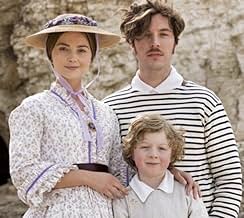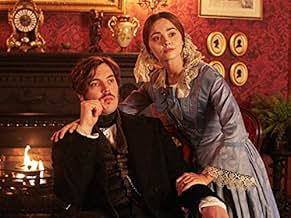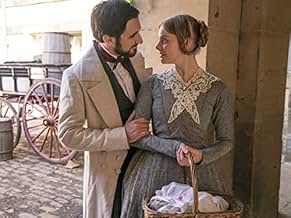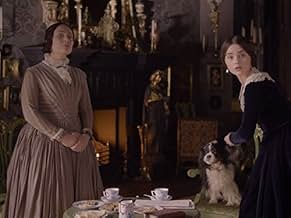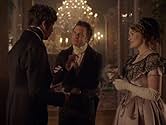La vida temprana de la reina Victoria, desde su ascenso al trono a la tierna edad de 18 años hasta su noviazgo y matrimonio con el príncipe Alberto.La vida temprana de la reina Victoria, desde su ascenso al trono a la tierna edad de 18 años hasta su noviazgo y matrimonio con el príncipe Alberto.La vida temprana de la reina Victoria, desde su ascenso al trono a la tierna edad de 18 años hasta su noviazgo y matrimonio con el príncipe Alberto.
- Nominado para 2 premios Primetime Emmy
- 11 premios y 19 nominaciones en total
Explorar episodios
Reseñas destacadas
**This is primarily intended as a rebuttal to some very unforgiving reviews.
I started watching this show when I first came out and as many other reviewers have already stated, I was absolutely captivated by Jenna Coleman's and Rufus Sewell's portrayals of Queen Victoria and Lord M, respectively. I maintain that Rufus was a brilliant Lord M, and frankly I think the reason the writers were able to successfully execute Lord M and Victoria's fabricated infatuation for one another is rooted in the casting. It wouldn't have worked if M was cast accurately, a bumbling old man 40 years her senior.
I'm actually very surprised to read so many criticisms of Tom Hughes's Albert. On the contrary, I thought he did an excellent job. I've always been quite interested in the monarchy and have read extensively on some kings and queens that have captured my imagination in particular - Victoria being one of them - and their personal relationships. It's well-known that V and A were besotted with one another; I believe Victoria wrote "Albert is beautiful" in her diary after their second meeting in 1839. It's also true that she did not want to get married and felt that she was being manipulated into a union with someone who was more convenient for the family than for love. Albert was shy, intellectually-inclined, and very handsome. I don't understand what element of that Tom Hughes neglected. His chemistry with Jenna was suspiciously compelling until I learned that they're together in real life. I think he was altogether very convincing - perhaps with a modern flair, but that seems to be the feel of the entire show.
Which brings me to my next point. For someone like me, who really enjoys costume dramas and romance, this is a wonderful show. The sets are magnificent (CGI leaves something to be desired, but it's not too offensive), the costumes are to die for, and the writing is good. No, it's not absolutely stellar. But it's certainly entertaining. The cast handles very artfully the script they've been given. If you are very knowledgeable about history and find it absolutely impossible to enjoy a show that has taken more than a few creative liberties, this is not the show for you. It's not anything near a documentary, and drama is paramount. I agree that truth is often stranger than fiction, and there are many stories that writer Daisy Goodwin could have spun into a far more accurate and believable series. That being said, I don't hold it against her. While there are some plot lines that seem to have been pulled out of nowhere, the majority of creative liberty comes in the form of exaggeration in this show. Inclinations and motivations are stretched to the nth degree to really show the watcher that this character is either a good guy or a bad guy.
I think the show is worth watching. If you're new to it, certainly watch up to episode 3 in season 1 - that's when Albert's character is really first introduced and the show begins to take a turn. Season 3 started last night here in the US and I found the premiere engaging. I'm excited to see what happens next, as long as Albert's death is conveniently delayed for as long as possible.
I started watching this show when I first came out and as many other reviewers have already stated, I was absolutely captivated by Jenna Coleman's and Rufus Sewell's portrayals of Queen Victoria and Lord M, respectively. I maintain that Rufus was a brilliant Lord M, and frankly I think the reason the writers were able to successfully execute Lord M and Victoria's fabricated infatuation for one another is rooted in the casting. It wouldn't have worked if M was cast accurately, a bumbling old man 40 years her senior.
I'm actually very surprised to read so many criticisms of Tom Hughes's Albert. On the contrary, I thought he did an excellent job. I've always been quite interested in the monarchy and have read extensively on some kings and queens that have captured my imagination in particular - Victoria being one of them - and their personal relationships. It's well-known that V and A were besotted with one another; I believe Victoria wrote "Albert is beautiful" in her diary after their second meeting in 1839. It's also true that she did not want to get married and felt that she was being manipulated into a union with someone who was more convenient for the family than for love. Albert was shy, intellectually-inclined, and very handsome. I don't understand what element of that Tom Hughes neglected. His chemistry with Jenna was suspiciously compelling until I learned that they're together in real life. I think he was altogether very convincing - perhaps with a modern flair, but that seems to be the feel of the entire show.
Which brings me to my next point. For someone like me, who really enjoys costume dramas and romance, this is a wonderful show. The sets are magnificent (CGI leaves something to be desired, but it's not too offensive), the costumes are to die for, and the writing is good. No, it's not absolutely stellar. But it's certainly entertaining. The cast handles very artfully the script they've been given. If you are very knowledgeable about history and find it absolutely impossible to enjoy a show that has taken more than a few creative liberties, this is not the show for you. It's not anything near a documentary, and drama is paramount. I agree that truth is often stranger than fiction, and there are many stories that writer Daisy Goodwin could have spun into a far more accurate and believable series. That being said, I don't hold it against her. While there are some plot lines that seem to have been pulled out of nowhere, the majority of creative liberty comes in the form of exaggeration in this show. Inclinations and motivations are stretched to the nth degree to really show the watcher that this character is either a good guy or a bad guy.
I think the show is worth watching. If you're new to it, certainly watch up to episode 3 in season 1 - that's when Albert's character is really first introduced and the show begins to take a turn. Season 3 started last night here in the US and I found the premiere engaging. I'm excited to see what happens next, as long as Albert's death is conveniently delayed for as long as possible.
On the basis of seeing the first episodes of this Masterpiece drama, broadcast in the UK by ITV, I can freely say that I am hooked on to it. Daisy Goodwin's script is both taut and cleverly written, while the performances of the main protagonists are uniformly convincing. I particularly like Jenna Coleman's characterization of the young Queen - so apparently vulnerable yet possessed with an inner strength of will that enables her to resist the repeated blandishments of her self-interest mother the Duchess of Kent (Catherine H. Flemming), who so dearly desires to assume the title of Regent, aided and abetted by her unscrupulous ally Sir John Conroy (Paul Rhys).
This eight-part drama wears its moral scheme on its sleeve by contrasting the hissable villain the Duke of Cumberland (Peter Firth), with the pragmatic yet goodhearted Lord Melbourne (Rufus Sewell), who admires the Queen yet remains convinced that she has to transform herself from an immature girl into suitably monarchical material, and will try his utmost to achieve that transformation. Sometimes he has to be cruel to be kind, but all in a good cause. In between these two extremes stands the Duke of Wellington (Peter Bowles), and Sir Robert Peel (Nigel Lindsay), both members of the Tory Party (and hence implacably opposed to Melbourne's politics), but interested in maintaining the business of government.
As with most television costume dramas, the sets and decor are both opulent and historically accurate, supplemented by useful CGI shots where necessary. I especially liked some of the cinematographic effects (by John Lee) - especially the use of aerial shots to suggest the insignificance of humanity when compared to the greater business of running the country.
And it is this sense of contemporaneity that lifts VICTORIA out of the run-of-the-mill and transforms it into living, breathing drama. We hear a lot about the importance of "duty" - from the Queen as well as her friends and enemies - and we are led to speculate on what that term really signifies. Is it just a catch-all description masking self-interest, or do people really believe in it? In light of recent political upheavals in the United Kingdom, with one Prime Minister resigning (ostensibly out of "duty"), and the opposition party tearing itself asunder with different conceptions of the same term, we wonder just how much VICTORIA is commenting on the present as well as the past, especially in its concern with politics and its relationship to the country's future.
I am definitely hooked, and await the remaining episodes with eager anticipation.
This eight-part drama wears its moral scheme on its sleeve by contrasting the hissable villain the Duke of Cumberland (Peter Firth), with the pragmatic yet goodhearted Lord Melbourne (Rufus Sewell), who admires the Queen yet remains convinced that she has to transform herself from an immature girl into suitably monarchical material, and will try his utmost to achieve that transformation. Sometimes he has to be cruel to be kind, but all in a good cause. In between these two extremes stands the Duke of Wellington (Peter Bowles), and Sir Robert Peel (Nigel Lindsay), both members of the Tory Party (and hence implacably opposed to Melbourne's politics), but interested in maintaining the business of government.
As with most television costume dramas, the sets and decor are both opulent and historically accurate, supplemented by useful CGI shots where necessary. I especially liked some of the cinematographic effects (by John Lee) - especially the use of aerial shots to suggest the insignificance of humanity when compared to the greater business of running the country.
And it is this sense of contemporaneity that lifts VICTORIA out of the run-of-the-mill and transforms it into living, breathing drama. We hear a lot about the importance of "duty" - from the Queen as well as her friends and enemies - and we are led to speculate on what that term really signifies. Is it just a catch-all description masking self-interest, or do people really believe in it? In light of recent political upheavals in the United Kingdom, with one Prime Minister resigning (ostensibly out of "duty"), and the opposition party tearing itself asunder with different conceptions of the same term, we wonder just how much VICTORIA is commenting on the present as well as the past, especially in its concern with politics and its relationship to the country's future.
I am definitely hooked, and await the remaining episodes with eager anticipation.
I can not believe the production company nor the various directors could/would want to end the series where they did, in the middle of an emotional crisis. There are another 40 plus years of history, let alone many wars, adventures, and the entire Industrial Revolution. Is it that actors were tired of the fabulous custumes or were they tired of riding in unglamorous coaches? I think most of the watching audience had emotional attachments to many of the characters and or actors, including good, bad, love and disgust, all good character development!!! It will never be too late to revive the series, albeit the actors have aged, but so have the characters!
10crazfox
Very beautifully done for the 3 seasons we got and hope that one day for more .
I google very now and then to see if they announce anything, hope that they keep the same actors as they have done the job really well and I'm happy to wait for the actors to get older for the role.
There are so many achievements and fails in Victoria's time. Historical events that we should never forget. I like it when shows do there best to show great moments and sad moments in history.
Loss of lives due to sickness War Harvest failing And the curious minds and industrial society.
It makes me want to travel and see this beautiful world.
I google very now and then to see if they announce anything, hope that they keep the same actors as they have done the job really well and I'm happy to wait for the actors to get older for the role.
There are so many achievements and fails in Victoria's time. Historical events that we should never forget. I like it when shows do there best to show great moments and sad moments in history.
Loss of lives due to sickness War Harvest failing And the curious minds and industrial society.
It makes me want to travel and see this beautiful world.
I usually don't mind when movies or shows are not historically accurate. Typically changed for dramatic effect and better pacing. However, they made Queen Victoria seem more caring about the ignored classes. She did not intervene on behalf of the Newport Chartists. She did not show compassion for the Irish during the Great Hunger and was known as the Famine Queen. Changing history to make people feel better about history is dangerous. It reduces the struggle and discrimination of people considered as other. Outside of the misrepresentation of Queen Victoria, the acting, set, costumes, screenwriting, and cinematography are commendable.
¿Sabías que...?
- CuriosidadesJenna Coleman was allowed to read Queen Victoria's diaries as research. Parts of the diaries were removed upon the Queen's instruction shortly after her death.
- PifiasThroughout the series, Victoria's dresses have zippers, some of which are even used on screen. Zippers were invented in 1851, and weren't introduced to the public until the Chicago World Fair in 1893, where they were met with little commercial success. The first use of a zipper in clothing occurred in 1925, 24 years after Queen Victoria died.
- Versiones alternativasSeries 1: PBS Masterpiece broadcasts add on average 5 minutes of additional footage per episode not shown in the ITV broadcasts. The exception to this are the first two episodes of Series 1 which for PBS airing were edited together to form a single feature-length episode for a two-hour timeslot; the edited version removes several minutes of footage from these episodes (including the original closing moments of episode 1). The North American DVD/Blu-ray release of Series 1 is the ITV version and thus does not include the extra footage seen on PBS. Also, the ITV broadcasts/DVD release indicate episode numbers in the opening credits alongside episode titles; this is not shown on PBS.
- ConexionesFeatured in Too Much TV: Episodio #1.21 (2016)
Selecciones populares
Inicia sesión para calificar y añadir a tu lista para recibir recomendaciones personalizadas
- How many seasons does Victoria have?Con tecnología de Alexa
- Will there be a 4th season?
Detalles
- Fecha de lanzamiento
- Países de origen
- Sitios oficiales
- Idioma
- Títulos en diferentes países
- Вікторія
- Localizaciones del rodaje
- Empresas productoras
- Ver más compañías en los créditos en IMDbPro
Contribuir a esta página
Sugerir un cambio o añadir el contenido que falta

Principal laguna de datos
What was the official certification given to Victoria (2016) in Japan?
Responde






